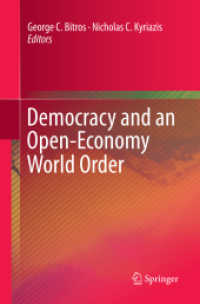Full Description
Much has been written about anti-apartheid resistance by the marginalized people of South Africa, as well as its violent repression by security forces in urban areas (e.g. Sharpeville massacre; Soweto riots). Very little attention has been paid to resistance by rural people. The Mpondo Revolts, which began in the 1950s and reached a climax in 1960, rank among the most significant rural resistances in South Africa. Here Mpondo villagers emphatically rejected the introduction of Bantu Authorities and unpopular rural land use planning that meant loss of land. The volume presents a fresh understanding of the uprising; as well as its meaning and significance then and now, particularly relating to land, rural governance, party politics and the agency of the marginalized.
Contents
CONTENTS
Acknowledgements ..................................................................................vii
1. Introduction ............................................................................................1
Thembela Kepe & Lungisile Ntsebeza
PART I ON THE REVOLTS
2. Resistance in the Countryside: Th e Mpondo Revolts Contextualized .........................21
Lungisile Ntsebeza (University of Cape Town, South Africa)
3. Reading and Writing the Mpondo Revolts .......................................43
Jimmy Pieterse (University of Pretoria, South Africa)
4. Govan Mbeki's Th e Peasants' Revolt: a Critical Examination .........67
Allison Drew (University of York, England)
5. The Mpondo Revolt through the Eyes of Leornard Mdingi and Anderson Ganyile.........................91
William Beinart (University of Oxford, England)
6. All Quiet on the Western Front: Nyandeni Acquiescence in the Mpondoland Revolt........................115
Fred Hendricks and Jeff Peires (Rhodes University, South Africa)
PART II INFLUENCE OF THE REVOLTS
7. Hoyce Phundulu, the Mpondo Revolt, and the Rise of the National Union of Mine Workers.............143
T. Dunbar Moodie (Hobart and William Smith Colleges, New York, USA) (with Hoyce Phundulu)
8. The Moving Black Forest of Africa: Th e Mpondo Rebellion, Migrancy and Black Worker Consciousness in KwaZulu Natal .....................................................165
Ari Sitas (University of Cape Town, South Africa)
PART III MEANINGS AND SIGNIFICANCE
9. The Shock of the New: Ngquza Hill 1960 .....................................191
Diana Wylie (Boston University, USA)
10. Tangible and Intangible Ngquza Hill: A Study of Landscape and Memory...........................209
Liana Müller (University of Cape Town, South Africa)
11. A Bag of Soil, a Bullet from Up High: Some Meanings of the Mpondo Revolts Today....................231
Jonny Steinberg (University of Oxford, England)
12. Discontent and Apathy: Post-apartheid Rural Land Reform in the Context of the Mpondo Revolts......243
Thembela Kepe (University of Toronto, Canada)
13. 'We don't want your development!': Resistance to Imposed Development in Northeastern Pondoland.....259
Jacques P. de Wet (University of Cape Town, South Africa)
Index .........................................................................................................279








